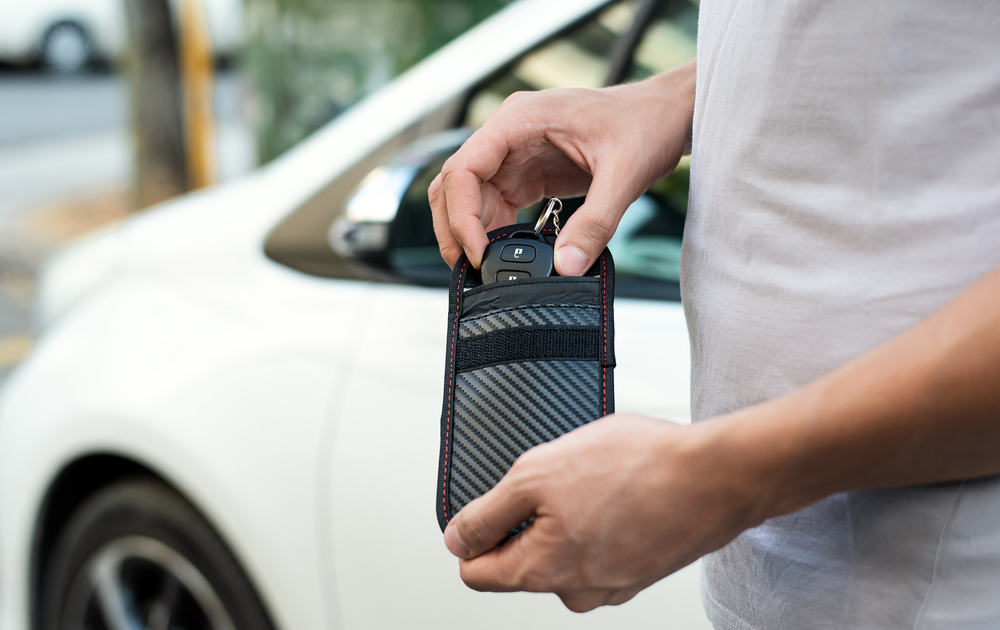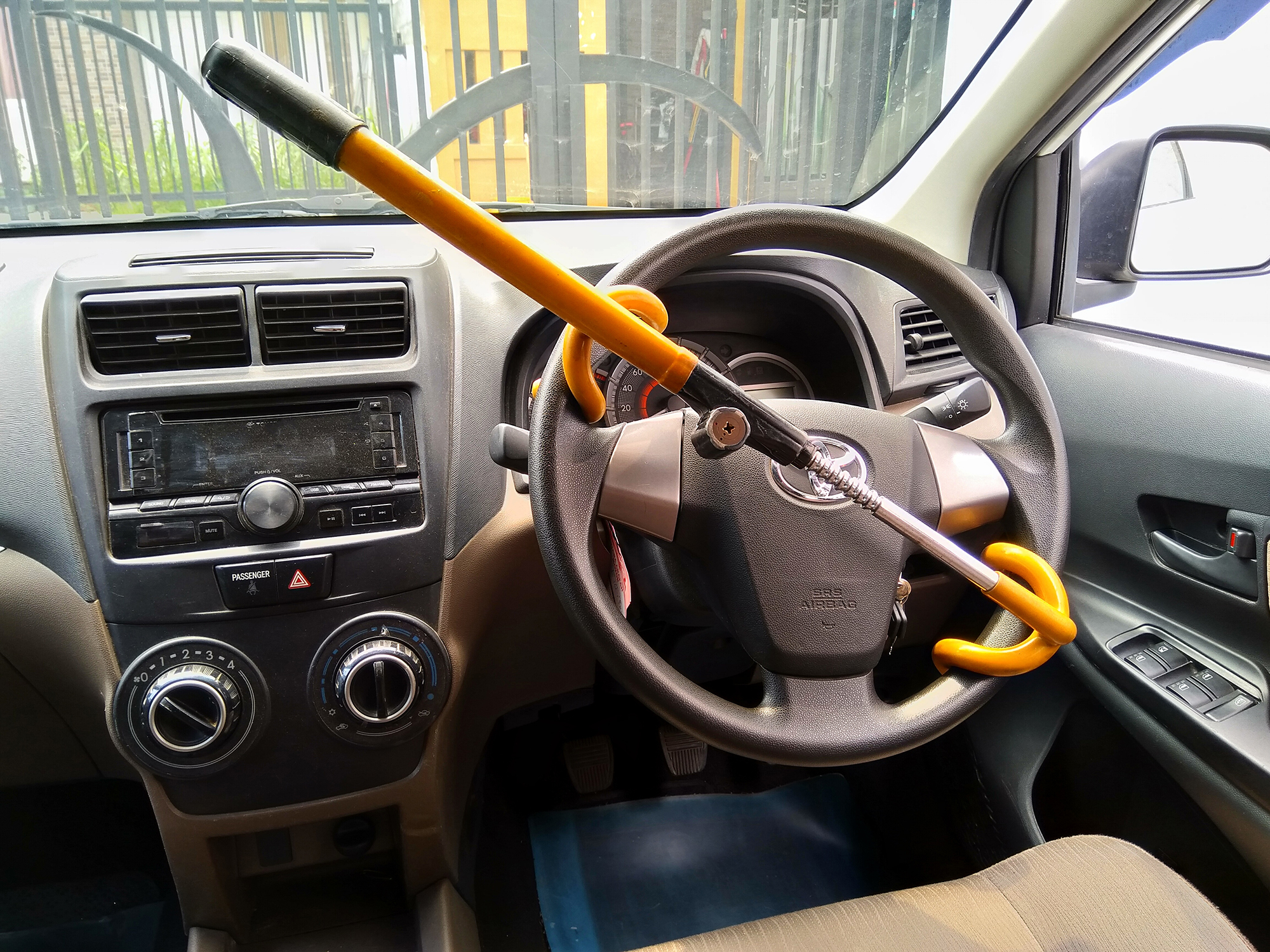Keyless car theft rising: how to keep your new car safe from thieves

We reveal the most-stolen car makes and the three most common new tactics criminals used to steal them.
Car thefts are on the rise.
The latest data from the Office for National Statistics (ONS) shows that across 2022 almost 131,000 vehicles were nicked.
That’s up by almost a quarter on the year before, a sharp annual increase.
And criminals are getting a bit more high-tech in how they go about stealing our motors.
Forget a crowbar ‒ they are far smarter ways that these thieves are making off with our cars, as highlighted by AA Insurance Services, particularly when it comes to keyless cars.
3 most common ways thieves make off with keyless cars
It's an obvious point to make, but one of the reasons behind rising theft of keyless cars is that there are more of them on the road: most motors made in recent years come standard with the technology.
But they can also be abused by thieves, offering easy access to your motor.
There are three big techniques being employed by crooks in order to get hold of keyless cars.
Relay thefts
This is perhaps the most common tactic, and relies on a couple of crooks working together.
One will stand close to your house, holding an amplifier.
This will essentially boost the signal from the key inside your home, helping it stretch to your car, parked outside.
The second crook will be using a transmitter, which will take on the signal from the amplifier and effectively con the car into thinking that it is the key.
The thieves can then open the car, start it up and drive away.
These tech gadgets can be picked up online relatively cheaply, and offer thieves a simple way to get away with your car, without having to damage it in order to gain entry or get it started.
Cloning the key
This one is a little more tricky, as the thieves need to get access to your car key. As a result, they will need to partner with dodgy affiliates at garages, car washes ‒ anywhere that you might let your car key out of your sight.
While they have your key, they clone it, effectively copying its unique signal onto a blank key. All they then have to do is get your address ‒ perhaps by following you home ‒ and they can then make off with your car, leaving you none the wiser.
Signal blocking
Finally, there is signal blocking, which as the name suggests is where the thieves use a signal jammer when you are trying to lock your car.
This might happen in a car park, and the thief is hidden out of sight.
You leave the car, press the lock button on your key and walk off, believing that the car has been locked properly. However, the jammer has stopped the lock taking place, meaning the thief now has access to your car.
Search for cheaper car insurance with MoneySuperMarket
Car models most popular with thieves
Of course, certain models of car are targeted more frequently by thieves.
It may be because they are easier to gain access to, but equally some models will get that focus because they can fetch big sums when sold on by the crooks.
Official data on the most stolen models was obtained from the DVLA by LeaseLoco. Here’s how the top 10 looks, and how theft numbers compare with years gone by:
|
Model |
Numbers stolen in 2022 |
Change from 2021 |
|
Ford Fiesta |
5,979 |
53% |
|
Land Rover Range Rover |
5,533 |
47.4% |
|
Ford Focus |
2,186 |
14.3% |
|
VW Golf |
2,036 |
16% |
|
Land Rover Discovery |
1,920 |
52.4% |
|
BMW 3 Series |
1,454 |
-0.7% |
|
Mercedes C Class |
1,378 |
-6.5% |
|
Vauxhall Corsa |
1,280 |
5.1% |
|
Vauxhall Astra |
1,240 |
13.1% |
|
Mercedes E Class |
866 |
5.9% |
Former car-thief-turned-TV-presenter Michael Fraser warns that any model of car can be worth stealing as they could be used in other crimes, while vans may be stolen for the tools or equipment inside them.
How can you beat the car thieves?

It sounds obvious but the police recommend that you should always manually check that your car is actually locked.
Avoid leaving windows open – even just a crack could be enough to allow criminals to gain entry.
Never leave money or other valuables in your car and try to keep it tidy inside. Thieves are drawn to messy car interiors as they think that they will find something worth stealing among the clutter.
If you still have a removable satnav device, don’t leave it out on display and remember to wipe your windscreen to remove the marks they leave, or a robber may realise one is hidden in the vehicle.
Keep car keys, whether it’s a keyless fob or conventional key, away from doors and windows and don’t hang them in hallways or kitchens where they can be found by opportunistic burglars.
Be aware that thieves can sometimes use keyhole ‘fishing’ devices to steal keys from inside your home if they are near the door.
You can use a Radio Frequency Identification (RFID) pouch or a Faraday bag to store keyless fobs to prevent thieves from hacking into the systems by blocking the signal.
It’s also advisable to keep car keys away from bedrooms. If burglars are really determined to steal your vehicle, it is best to avoid a confrontation and keep your family safe.
Park defensively
How you park your car can also make a difference. The important thing is to make stealing your car more of a hassle for criminals.
If you have a driveway, use it. Thieves are less likely to want to come close to your home to steal your vehicle due to the increased likelihood they could attract attention.
You should also avoid reversing into your driveway if possible.
Drive in normally as having to reverse your vehicle out will add precious seconds onto the time it might take a determined criminal to steal your car and increase the likelihood that they could be disturbed.
It’s also a good idea to have security lights outside the house and improve your home security.
If you are parking away from home, find a busy well-lit street to park in or a staffed car park, even if it means a slightly longer walk.
You should park your car next to other vehicles in a car park if you can rather than leaving it on its own in an isolated area.
Also, park with your wheels turned towards the kerb and in car parks with your wheels turned towards the neighbouring car.
Again, this will just add an extra few seconds to the time it could take for a thief to manoeuvre it out and potentially deter them from targeting your car.
Find cheap parking across the UK in seconds with JustPark

Use a steering lock or disabling device
Police are advising motorists to go back to using old-fashioned steering locks to keep cars secure and deter thieves.
There are many different ones on the market now, including the Disklok and the Streetwize Urban X, which covers the whole steering wheel.
There’s also the Carpoint Steering Wheel Lock Elephant that locks the steering wheel and the Master Lock Car Anti-Theft Device, which attaches between the steering wheel and the brake pedal.
These steering locks vary in price from around £100 to over £150 for the Disklok.
While the Disklok is pricey, it is police-approved.
Some of the devices, such as the Urban X, are said to be unsuitable for use by drivers of new Peugeot cars, according to research by The Sun, or more suited for use in smaller cars, such as the Master Lock.
Yet any of these devices are likely to work at least as a deterrent, especially if they are brightly coloured, as many of them tend to be.
These simple measures should help to protect your car and deter thieves – and make you less likely to fall victim to this expensive and unpleasant crime.
*This article contains affiliate links, which means we may receive a commission on any sales of products or services we write about. This article was written completely independently.
Comments
Be the first to comment
Do you want to comment on this article? You need to be signed in for this feature